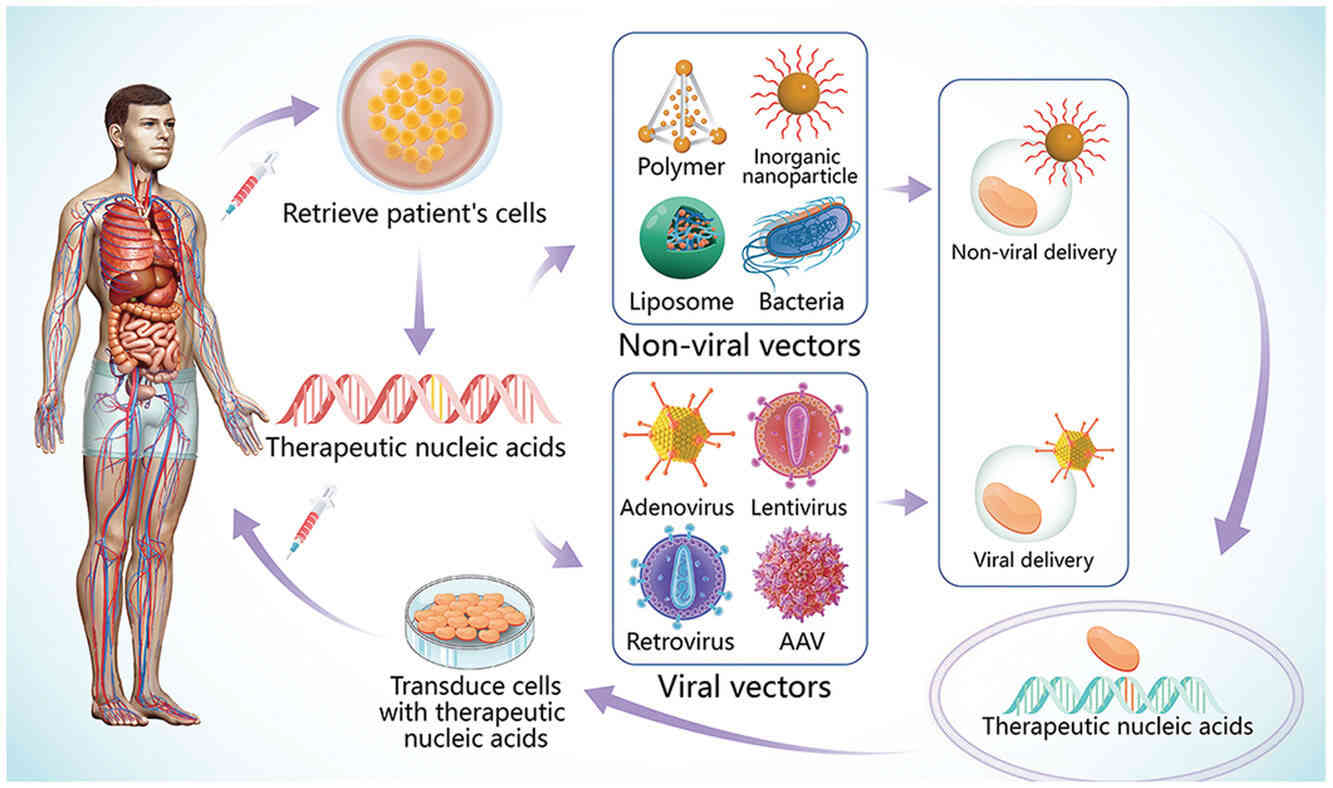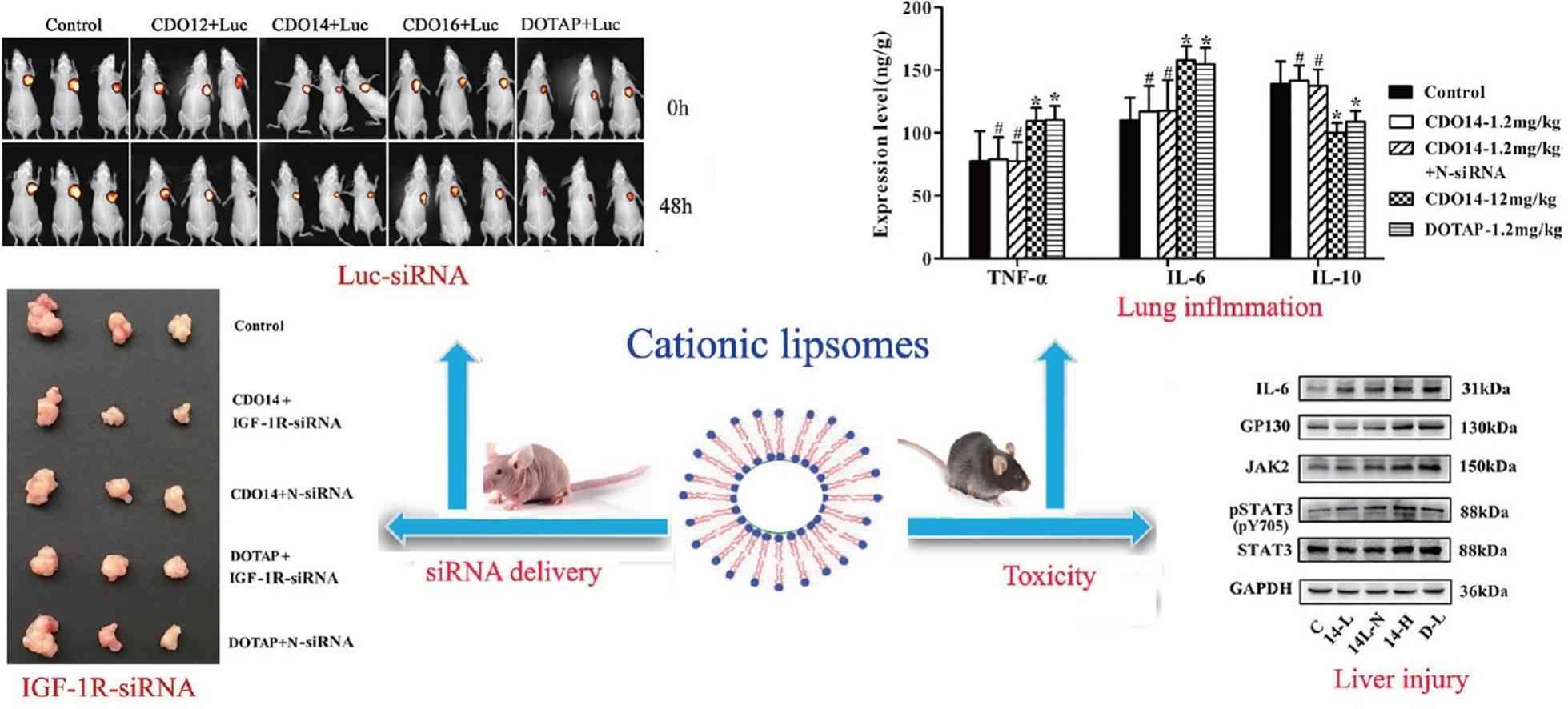Liposome-Based Gene Delivery System Development
Inquiry
Gene therapy offers a transformative approach to treating infectious and hereditary diseases by utilizing various nucleic acids (NA). Liposomes, as versatile non-viral vectors, play a pivotal role in delivering therapeutic genes through transfection. At CD Formulation, we are committed to developing state-of-the-art liposome delivery systems for gene therapy, empowering researchers and pharmaceutical enterprises to achieve groundbreaking results in their projects.
The Need for Liposome-Based Delivery in Gene Therapy
A major challenge in gene therapy is delivering genes specifically to tumor cells while avoiding unintended effects on normal cells. Therefore, various carrier-mediated gene delivery systems are designed to improve delivery precision. Among them, liposomes are a promising alternative. Due to their size and charge regulation flexibility, liposomes have lower immunogenicity and toxicity profiles. Their functions can be achieved based on size, charge, layer number, surface modification, and lipid composition. Another advantage of nucleic acid delivery is that liposomes can effectively accumulate within tumors through passive and active targeting mechanisms.
 Fig.1 Overview of gene therapy strategies. (Yu C, et al, 2020)
Fig.1 Overview of gene therapy strategies. (Yu C, et al, 2020)
Our Liposome Delivery System Development Services
Cationic Liposome Development Service
We provide comprehensive development services for cationic liposomes to enhance gene delivery efficiency and targeting precision. For instance, incorporating some groups into liposomes can prolong their half-life in vivo and improve their targeting capabilities. Furthermore, peptide-modified liposomes exhibit excellent biocompatibility and facilitate interactive interactions between delivery system and cellular membranes.
Polyethylene Glycol Liposome Development Service
PEGylation represents the gold standard for modulating the surface characteristics of liposomes, with numerous pegylated therapeutics and nanoparticles. We provide PEG-lipid derivatives such as dendrimeric PEG or branched PEG lipid-modified liposomes, which can achieve even more enhanced 'invisible' properties.
Anionic Liposome Development Service
Anionic liposomes offer significant advantages in mitigating cytotoxicity and interactions with serum proteins commonly associated with cationic liposomes. During our formulation development process, we offer various strategies aimed at minimizing excipients and focusing on coating technologies to construct safe and efficient anionic liposome drug carriers, thereby providing an innovative nanocarrier option for gene delivery.
Our Expertise in Liposome Delivery Systems for Gene Therapy
| Techniques and Platforms |
Specifics |
| Cationic Liposome Technology |
- Design and synthesis of cationic liposome techniques.
- The technology of cationic liposomes includes several types, such as cationic lipids with head-to-tail connections, amphipathic cationic lipids, symmetric and asymmetric dumbbell-shaped cationic lipids, and cationic liposome gene vectors based on metal complexes.
|
| Polyethylene Glycol Liposome Technology |
- Preparation techniques for liposome derivatives modified with PEG-lipids encompass a range of molecular weights and diverse functional groups.
- Synthesis technology of polyethylene glycol-lipid conjugates.
|
| Anionic Liposome Technology |
- Research techniques for the binding of anionic liposomes to B Cells.
- Study on anionic lipids as immunogenic agents.
|
Why Choose CD Formulation?
Exceptional Development Capabilities in Liposome Delivery Systems for Gene Therapy
- Our delivery technology is optimized for diverse ranges of nucleic acid therapies, including small interfering RNA (siRNA), small activating RNA (saRNA), and messenger RNA (mRNA).
- Effective for the treatment of various types of tumors and rare diseases.
A highly Effective and Robust Evaluation Framework
- A range of advanced instruments for liposome characterization, covering the entire process.
- The stability study platform supports precisely evaluating store conditions and offers verifiable data.
- The quality research platform is specifically designed for liposomes to efficiently evaluate the characteristics in vivo and in vitro.
An Exceptionally Adept and Esteemed Professional Team
- Our technical team is comprised of a diverse array of scientists from medicine, biological engineering, materials science, and immunology.
- We have effectively assisted numerous enterprises and academic institutions in the research and development of liposomes for gene therapy.
Published Data
Technology: Peptide-based cationic liposomes in siRNA Cationic liposomes technique
Journal: Colloids and Surfaces B: Biointerfaces
IF: 5.4
Published: 2019
Results: This study explores the lipid with 14 carbon double chains and trimyristin as the head group, comparing it with DOTAP, a quaternary ammonium lipid, to study the toxic mechanisms related to the head group of the lipid. First, the in vivo siRNA delivery effects mediated by cationic peptide-based liposomes were examined in a mouse model. Subsequently, the toxicological mechanisms of the liposome delivery process were deeply analyzed. Finally, the potential applications of cationic peptide-based liposomes in gene delivery were demonstrated. The research findings are greatly significant in promoting the clinical application of liposomes in gene therapy.
 Fig.2 Illustration of Toxicological exploration of peptide-based cationic liposomes in siRNA delivery. (Zhu Y, et al, 2019)
Fig.2 Illustration of Toxicological exploration of peptide-based cationic liposomes in siRNA delivery. (Zhu Y, et al, 2019)
CD Formulation excels in creating highly efficient liposome-based gene delivery systems for pharmaceutical companies and institutions. Our expertise ensures the development of robust and customizable solutions to advance gene therapy research. Contact us to discuss how we can support your scientific objectives.
References
-
Yu C, Li L, et al. Recent advances in stimulus‐responsive nanocarriers for gene therapy. Advanced Science. 2021 Jul; 8(14): 2100540.
- Zhu Y, Meng Y, et al. Toxicological exploration of peptide-based cationic liposomes in siRNA delivery. Colloids and Surfaces B: Biointerfaces. 2019 Jul 1; 179: 66-76.
How It Works
STEP 2
We'll email you to provide your quote and confirm order details if applicable.
STEP 3
Execute the project with real-time communication, and deliver the final report promptly.
Related Services


 Fig.1 Overview of gene therapy strategies. (Yu C, et al, 2020)
Fig.1 Overview of gene therapy strategies. (Yu C, et al, 2020) Fig.2 Illustration of Toxicological exploration of peptide-based cationic liposomes in siRNA delivery. (Zhu Y, et al, 2019)
Fig.2 Illustration of Toxicological exploration of peptide-based cationic liposomes in siRNA delivery. (Zhu Y, et al, 2019)
